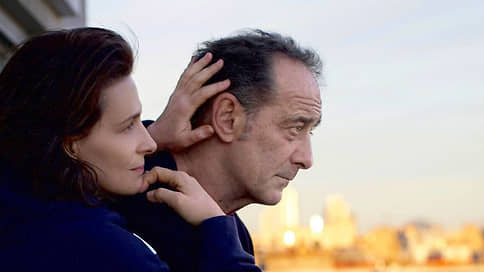Triple bottom – Newspaper Kommersant No. 166 (7367) dated 09/09/2022
[ad_1]

Claire Denis’s drama about the love triangle “With Love and Fury” (Avec amour et acharnement) was released on domestic screens and was awarded the “Silver Bear” at the Berlin Film Festival for best director. The film of Denis, deservedly enjoying a reputation as the most radical and most uneven French director, plunged Mikhail Trofimenkov in perplexity.
If Denis were not the author of such mesmerizing, painful and beautiful hallucinations about the disastrous adventures of the human body, like “I Can’t Sleep” (1994) or “Beautiful Job” (1999), her film could be taunted in the spirit of jokes about “love for three ” like: “Jean, come here, the three of us with Francois will have much more fun.”
Sarah (Juliette Binoche) has been living with Jean (Vincent Lindon) for nine years and works for RFI, where she interviews Lebanese activists and African footballers about immigration and racism. Ex-rugby player Jean delayed – for what, the audience is not supposed to know, they did not come out with a snout – the term and does not even have a credit card. His social function is to go shopping at the supermarket, roam around government offices and, to put it mildly, unsuccessfully raise a black son from his first marriage Marcus (Issa Perika).
Suddenly—ah, that beautiful old melodramatic “suddenly”—François (Gregoire Colin) rides into their lives on a motorcycle. Sarah’s old lover and Jean’s accomplice and friend, who got out of the water dry, engages him in a newborn office for recruiting young players, and at the same time causes a swift jack of feelings in Sarah’s heart. It’s a no brainer that Francois’s business is another scam, and he doesn’t need anything from his former lover except anal sex, but both Jean and Sarah rush headlong into new business and sexual experiments. Everything ends – and this is not a spoiler, but a generic curse of what the French themselves call “joint Franco-French productions” – nothing.
The film suffers from echolalia, a disease characterized by uncontrolled repetition of words. Any dialogue between the protagonists sounds like they are chewing a doormat in chorus, endlessly repeating meaningless remarks and bringing themselves to hysterical exaltation. More or less like this.
I saw you kiss him on the lips! No, you didn’t see me kiss him on the lips! Why didn’t I see you kiss him on the lips!? Because I didn’t kiss him on the lips! What did you do if you didn’t kiss him on the lips?! I avoided kissing him on the lips! No, you didn’t shy away from kissing him on the lips!
Echolalia Denis is also visual. Again and again behind the attic-attic window-window of the heroes’ apartment Parisian-Parisian roofs-roofs. The right word, you understand the fury of Jean, at the moment of the decisive-decisive explanation-explanation screaming how tired he was of this view from the window. To the audience, he is also pretty already.
You can’t believe your eyes: is it really that Denis took it off. Knowing her penchant for extreme and bloodthirsty outcomes, you involuntarily catch a premonition of something like that in the most innocent episodes. Here Jean is trying on a tie with a lost look: will he hang himself? Here the bodies of lovers in the sex scenes take on a strange, greenish-gray hue: shouldn’t they eat each other, as the heroine Beatrice Dahl ate partners (“Every day, then trouble”, 2001)? Alas, he did not hang himself, alas, they did not eat.
Then, perhaps, this is a parody of the hysteria, pettiness, hypocrisy, hysterical soul-searching of the Parisian creative class? But, firstly, for Denis, who either casts the heroes into the hell of the African genocide (“White Material”, 2009), or sends them on a doomed space journey (“High Society”, 2018), such satire is too small. And secondly, in this case it is necessary to recognize en masse the entire corpus of Parisian cinema, dedicated to just such soul-searching, but filmed quite seriously, satire. No, for all the ridiculousness of the on-screen love triangle, Denis, perhaps, takes it seriously.
Maybe there is some higher, “post-colonial” meaning in Jean’s relationship with Marcus, who steals money from the card of Nelly’s grandmother (Bulle Ogier). Speculative motives can be dismissed in advance. For Denis, the daughter of a colonial official who grew up in the Upper Volta, Cameroon and Djibouti, the African theme is personal and relevant. But she needs the Marcus line only to ensure a benefit performance for the author’s cinema star Ogier, who honestly fulfilled the role of a tragicomic grandmother.
A real drama in the spirit of Denis is played out in parallel with the release of the film in French distribution – in life. In fact, it is customary in honor of the premiere to give, albeit hypocritical, compliments to screen partners, and not to denounce them for their “machism”, as Binoche did in relation to Lyndon in a radio interview, and she added: “He wants to go into politics. What, you still don’t understand this? It is obvious. He is in a panic that they do not notice him, that they do not hear him, and now he is doing everything possible to prove his existence. But I won’t let you trample on me.” Yes, in order to publicly quarrel two unconditional stars of French cinema, Denis’s talent is needed.
[ad_2]
Source link






